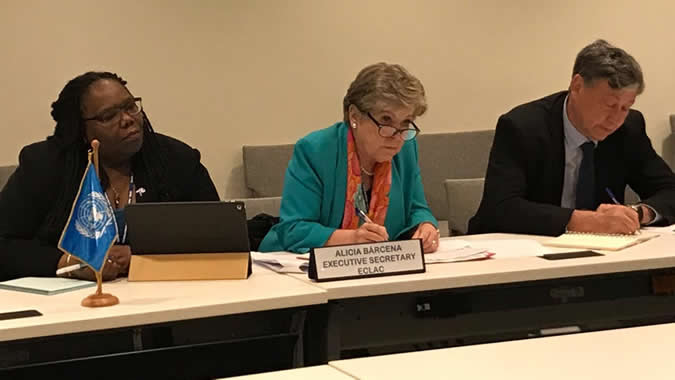Alicia Bárcena Reviewed with Caribbean Authorities Progress on the Debt for Climate Adaptation Swap Initiative, Including the Creation of a Resilience Fund
ECLAC’s Executive Secretary met with the Prime Ministers of Antigua and Barbuda, Saint Lucia, and Saint Vincent and the Grenadines in the framework of the 74th session of the United Nations General Assembly being held in New York.

The Executive Secretary of the Economic Commission for Latin America and the Caribbean (ECLAC), Alicia Bárcena, met this Monday, September 23, with Prime Ministers Gaston Browne of Antigua and Barbuda, Allen Chastanet of Saint Lucia, and Ralph Gonsalves of Saint Vincent and the Grenadines, to review progress on the Debt for Climate Adaptation Swap Initiative, including the creation of a resilience fund proposed by the Commission for small island Caribbean states.
During the meeting – which took place in the framework of the Climate Action Summit and the 74th session of the United Nations General Assembly, which is being held in New York –the Caribbean authorities thanked ECLAC for its proposal and recognized the urgent need for rapid implementation. This initiative seeks to respond to the Caribbean’s most urgent development needs: its high level of debt, and vulnerability to climate change and natural disasters.
“This proposal goes beyond a traditional debt restructuring, since it links debt relief to investment in sustainable development and green economy projects. In other words, it offers a strategy to provide fiscal space and relief to economies overburdened by public debt and debt servicing costs, while at the same time directing increased resources towards investment in climate adaptation projects and green industries to build resilience,” Alicia Bárcena highlighted.
A reduction in the debt-to-GDP ratio of at least 12.2 percentage points in Antigua and Barbuda, Saint Lucia, and Saint Vincent and the Grenadines would allow for generating at least one point of GDP growth in each country, according to ECLAC’s estimates. A 1%-point growth increase in GDP would take the weighted average growth rate of these three countries to levels seen prior to the global financial crisis, the Commission has indicated.
While the debt negotiations take place, Bárcena proposed to the authorities that in parallel countries advance with the establishment of a Caribbean Resilience Fund (CRF).
“This Fund could, on the one hand, attract resources (concessional and grant) from countries and agencies that want to support climate resilience building in the region and, on the other hand, could also be capitalized from resources arising from the successful implementation of the debt for climate adaptation swap initiative,” she stated.
“The Caribbean Resilience Fund,” Bárcena added, “should be housed in institutions from the subregion, such as the Caribbean Development Bank, for example, and/or the Caribbean Development Fund, to help channel funds for construction projects related to climate and resilience.”
Several Caribbean countries rank among the most highly indebted in the world. In 2018, the average Caribbean debt was 70.5% of GDP. According to ECLAC’s assessment, without meaningful intervention, the countries of the Caribbean cannot grow their way out of the current debt crisis.
In addition, since 1990, more than 385 climate-related disasters have been recorded in the subregion. Since 2000, the Caribbean has suffered at least eight disasters with an annual cost of between 33% and 200% of the GDP in the affected countries. Annual losses due to ever more catastrophic climate events in the Caribbean are estimated at $3 billion dollars.
This vulnerability to climate change is directly related to the Caribbean’s growing debt burden, according to Bárcena, who later attended the opening session of the Climate Action Summit at UN headquarters. This event was inaugurated by the global forum’s Secretary-General, António Guterres, and included the participation of Heads of State from the region’s countries (such as Barbados, Chile, Colombia, Costa Rica, Ecuador, Guatemala, Jamaica and Saint Lucia) as well as important remarks by the young Swedish activist Greta Thunberg.
Subregional headquarter(s) and office(s)
Type
Country(ies)
-
Antigua and Barbuda
- Caribbean
-
Saint Lucia
-
Saint Vincent and the Grenadines
Contact
Public Information Unit
- prensa@cepal.org
- (56 2) 2210 2040
